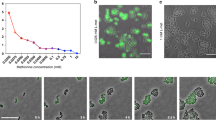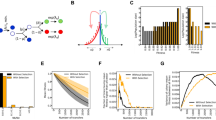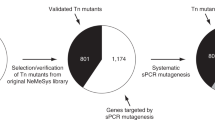Abstract
DURING the past nine years we have demonstrated that most named cultures of Acetobacter species obtained from culture collections contained a proportion of Acetobacter cells which, on plating, gave rise to colony forms different from those yielded by the bulk of the cells in the culture. On isolating both kinds of colony they were found, in many cases, to differ by only one, or at the most two properties, notably those used in Frateur's classification1.
This is a preview of subscription content, access via your institution
Access options
Subscribe to this journal
Receive 51 print issues and online access
$199.00 per year
only $3.90 per issue
Buy this article
- Purchase on Springer Link
- Instant access to full article PDF
Prices may be subject to local taxes which are calculated during checkout
Similar content being viewed by others
References
Shimwell, J. L., Antonie van Leeuwenhoek, 25, 49 (1959).
Schell, J., and De Ley, J., Antonie van Leeuwenhoek, 28, 445 (1962).
De Ley, J., J. gen. Microbiol., 24, 31 (1961).
Shimwell, J. L., J. Inst. Brew., 62, 339 (1956).
Author information
Authors and Affiliations
Rights and permissions
About this article
Cite this article
SHIMWELL, J., CARR, J. Mutant Frequency in Acetobacter. Nature 201, 1051–1052 (1964). https://doi.org/10.1038/2011051b0
Issue Date:
DOI: https://doi.org/10.1038/2011051b0
This article is cited by
-
Environmentally triggered genomic plasticity and capsular polysaccharide formation are involved in increased ethanol and acetic acid tolerance in Kozakia baliensis NBRC 16680
BMC Microbiology (2017)
-
The plasmids of Acetobacter xylinum and their interaction with the host chromosome
Molecular and General Genetics MGG (1987)
-
Isolation and identification of acetic acid bacteria from different ecosystems
Proceedings / Indian Academy of Sciences (1971)
Comments
By submitting a comment you agree to abide by our Terms and Community Guidelines. If you find something abusive or that does not comply with our terms or guidelines please flag it as inappropriate.



